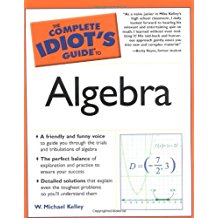Algebra: Introducing Variables
Introducing Variables
A variable is a letter that represents a number; it works sort of like a pronoun does in English. Rather than saying "Dave is a funny guy, because Dave can do an uncanny impression of Dave's grandmother," it's much more natural to say "Dave is a funny guy, because he can do an uncanny impression of his grandmother." Those pronouns he and his both clearly refer to Dave, so there's no confusion on the part of the reader, and the second sentence sounds a whole lot more natural.
Remember the directions I gave for finding the least common denominator? I called the largest original denominator Bubba, which is actually a variable! (Although in algebra we usually use letters rather than Southern-sounding nicknames.) Once I defined Bubba, I could have shortened my explanation using the full power of variables like so: "I will call the largest denominator Bubba and the other denominators a and b (it does not matter which is which). If both a and b divide evenly into Bubba, then Bubba is your least common denominator. If not, calculate 2 Bubba, and see if a and b divide evenly into that. If that number doesn't work, try 3 Bubba, then 4 Bubba, and so on until you find a number into which a and b divide evenly."
Critical Point
Like in all math textbooks, variables are italicized so that they stand out from the surrounding text.
See how much easier it is to say "2 Bubba" rather than "two times the largest denominator, as you identified in the previous step?" Besides simplifying things, however, variables serve another important purpose: They allow you to speak very precisely. Precision is important to mathematicians, who want no confusion whatsoever in their explanations.
For example, I described a fraction's reciprocal as the fraction flipped upside down. A more precise explanation could be given using variables: "The reciprocal of the fraction ab (such that a and b are integers) is the fraction ba." There's no need for me to say "the old numerator becomes the new denominator," because you can see the old numerator, a, actually become the new denominator.
As useful as variables are, some math instructors overuse them. While they may provide shorter and more concise definitions, they are also more confusing to understand, especially for new algebra students. Therefore, I will almost always accompany formulas, variables, and definitions with a plain English explanation, so that you can both understand better and begin to piece together how to speak mathematically as well.

Excerpted from The Complete Idiot's Guide to Algebra © 2004 by W. Michael Kelley. All rights reserved including the right of reproduction in whole or in part in any form. Used by arrangement with Alpha Books, a member of Penguin Group (USA) Inc.
You can purchase this book at Amazon.com and Barnes & Noble.







